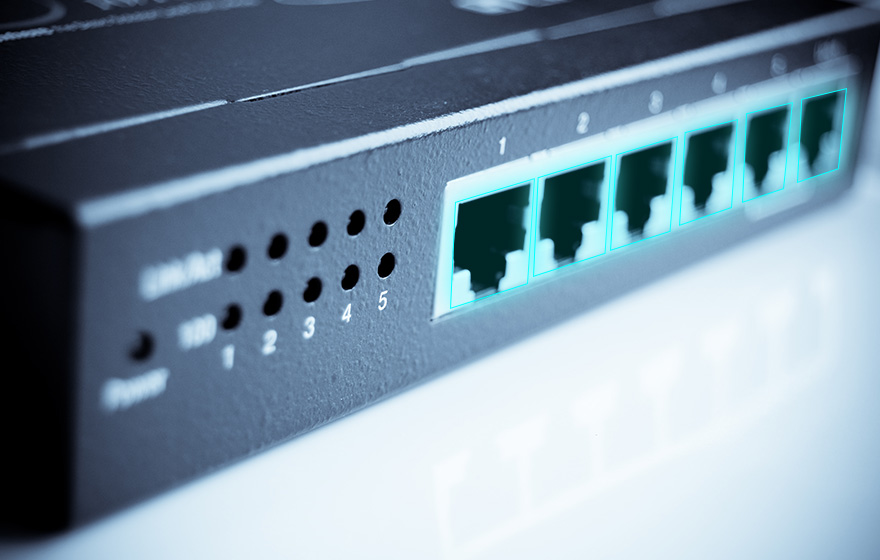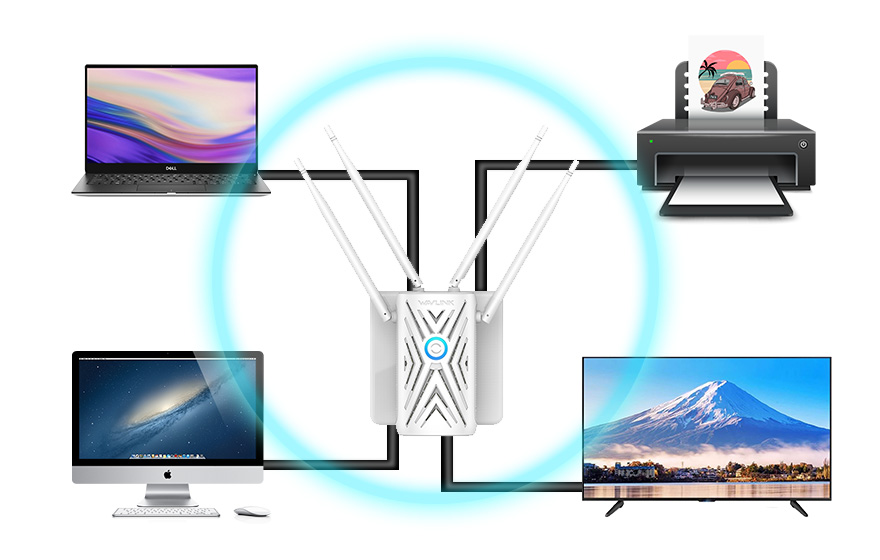
Wi-Fi extenders are devices designed to expand the coverage range of your primary wireless router, eliminating Wi-Fi dead spots in your home. They can also extend your Wi-Fi network to areas like the garage, basement, or even the garden.
Typically, Wi-Fi extenders are set up to wirelessly connect to the main router, requiring only a power outlet to function. While this wireless connection between the extender and router is convenient, it can come with limitations such as distance constraints, signal attenuation, and interference issues. If you want to avoid these problems, using an Ethernet hardwired connection with your Wi-Fi extender is a good idea.
The Ethernet port on a Wi-Fi extender serves two purposes:
A Wi-Fi extender extends the coverage area of your Wi-Fi network by rebroadcasting the same data packets as your router. When you plug an Ethernet cable into the Wi-Fi extender and connect it to the main router, the extender becomes a robust access point capable of rebroadcasting Wi-Fi signals at the same internet speed as the router. Additionally, the Wi-Fi extender will establish a new Wi-Fi network that you can directly connect to for internet access, bypassing the router.
Benefits of using an wifi extender with ethernet port
Using an Ethernet cable to directly connect the Wi-Fi extender to the router offers several advantages:
1. Faster Connection Speeds: While the latest Wi-Fi 6 (802.11ax) standard supports speeds of up to 9.6 Gbps in theory, practical Wi-Fi 6 speeds are often much lower due to various interference and signal loss factors. Some Ethernet systems operate at speeds of 10 Gigabit (10,000 Mbps), which is the latest and fastest standard, suitable for streaming multiple 4K movies simultaneously. This means you can fully utilize your internet package, making it ideal for bandwidth-intensive applications like streaming and gaming.
However, it's essential to note that both Wi-Fi and Ethernet connections cannot exceed the speed provided by your ISP internet plan.
2. Lower Latency: Connecting the Wi-Fi extender to Ethernet generally results in better performance. Wi-Fi can introduce latency of over 100 milliseconds, while Ethernet cables have negligible latency. Therefore, Ethernet provides lower latency and less lag when compared to Wi-Fi. This difference may not be noticeable in regular internet browsing but can significantly impact activities that demand high bandwidth and low latency, such as online meetings, multiplayer video calls, and large online gaming sessions.
3. More Reliable Connection: While Wi-Fi is versatile and doesn't require physical connections, it is susceptible to environmental interference, such as microwaves, cordless phones, and other Wi-Fi signals. Additionally, Wi-Fi signals weaken with distance and struggle to penetrate obstacles like brick walls. Ethernet connections can circumvent these issues, offering a more stable and longer-distance connection. For instance, if you want to add a wireless access point to your garage or an upstairs home office, using an Ethernet connection is a suitable option.
4. Unified Network: This setup often creates a single network, eliminating the need to switch between networks as you move around the house—a common issue with auxiliary networks.
5. Extender Ethernet Port for Local Devices: In addition to creating a stable and powerful Wi-Fi access point when connected to the main router, the Ethernet port on the extender can be used to connect other local devices that require a stable connection. If you use Ethernet to hardwire local devices such as PCs, smart TVs, and gaming consoles to the extender, you will experience faster download speeds and lower latency compared to using Wi-Fi.
Do All Wi-Fi Extenders Have Ethernet Ports?
Not all Wi-Fi extenders come with Ethernet ports. This is because the concept of extenders is to expand wireless signals so that end devices can also connect wirelessly. However, some extenders do come with Ethernet ports, providing more networking options. It's crucial to check for the presence of Ethernet ports and the type (input/output) before purchasing a Wi-Fi extender. Wi-Fi 6 extenders with two Gigabit Ethernet Ports, like the Wavlink Wi-Fi 6 extender, offer stable Ethernet connections and can switch between AP and Mesh Router modes.
Mesh Networking
Apart from Wi-Fi extenders, you can consider another solution for extending Wi-Fi coverage is using a Mesh Wi-Fi system. Mesh Wi-Fi, also known as whole-home wireless network systems, involves using multiple routers (which can be extenders or boosters) that support Mesh Wi-Fi as satellite nodes connected to the main router. These nodes interconnect in a mesh, enabling dynamic routing and seamless Wi-Fi roaming throughout the entire home. This approach addresses the signal attenuation issues often associated with using Wi-Fi extenders. You can set up a mesh Wi-Fi network with entirely wireless connections or a mix of wireless and wired connections.
Considerations When Connecting an Ethernet Cable to Your Wi-Fi Extender
While there are many benefits to connecting an Ethernet cable to your Wi-Fi extender, there are some factors to consider:
1. Ethernet Wiring: If your home already has pre-installed Ethernet cables with readily available Ethernet ports on the walls, connecting the Wi-Fi extender with a cable may be straightforward. However, if not, adding and arranging these cables can be time-consuming and costly.
2. Physical Layout: Take your home's layout into account. Are there obstacles like furniture between the router and extender that need to be navigated, or do you need to drill holes through walls or run cables from the ceiling? These factors can make the setup more complex.
3. Cost: Wi-Fi extenders or routers with multiple Ethernet ports may be more expensive than those without Ethernet ports.
Conclusion:
In most cases, connecting an Ethernet cable to your Wi-Fi extender can be beneficial. However, you should also consider the practicality and cost of implementing this solution.If you cannot use Ethernet cables to connect your Wi-Fi extender, you can still have the extender wirelessly connect to the router or opt for a more intelligent mesh networking solution.
Get the Scoop First
Subscribe to our official website to receive exclusive first-hand news and stay up-to-date on our new product releases and promotions!